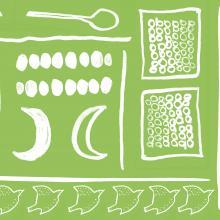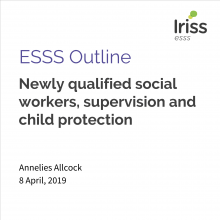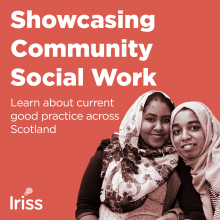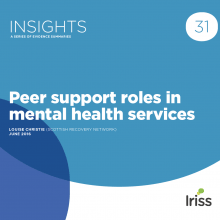Pam Duncan, policy officer at Independent Living in Scotland project, speaks about the importance of peer support in order to live a more independent and fulfilling life.
One of the most important things for me, and for other disabled people that I've worked with and that I'm friends with as well, is that peer support as I've said, and I've probably laboured that point, is absolutely essential. And a key way that people access that is through disabled people's organisations in their area.
So for example, in Glasgow, Glasgow Centre For Inclusive Living provides the support for self-directed support. So they are the support organisation. But not only then are they in a unique position to be able to provide employment law advice, payroll support and in fact a payroll service, and but also they, as a disabled person's organisation, they are disabled people, and so they have a wide network of disabled people to access. And, that's a good way for people to be able to talk to one another, through that system and through that service and through that organisation. There's also Glasgow Disability Alliance in Glasgow which is closely linked to the Glasgow Centre for Inclusive Living and also, the project I work for - Independent Living in Scotland. So all of these organisations, and there are several across the country in various different areas, in Edinburgh, for example, there's Lothian Centre for Independent Living. And then nationally there's Inclusion Scotland, there's Self Directed Support Scotland and the Scottish Disability Equality Forum. So there's various disabled people's organisations who provide services, some of them. Some of them are kind of political activist organisations and others are specifically focused to Self Directed Support.
But, all of these organisations when they host events, when they provide services, are doing so with disabled people running them, guiding them and for them. And they are for disabled people, so it's a really good networking opportunity for disabled people, and it provides the service that Self Directed Support needs in order for it to work. So it's a kind of good bang for your buck if you feel like, and it works really well. There's obviously other ways that people can communicate, and I've always been a bit to say reluctant to set up a specific site so, for example, people say "what about a disabled person's Facebook?" and, I would say, well what about Facebook? Or, you know, what about Twitter?
So, those are obviously sites that, and I know for example through my own Facebook that I have used it to try and recruit staff in the past and I have also connected with other disabled people through it and asked them questions. I've had one question recently, a friend on Facebook has messaged me privately and said "I want to move to Spain, any ideas on how you do it as a disabled person?" So, these are all things that people can use and that can be promoted to them. But, things like community of practices that I know of as a professional, sort of, realm, if that's the right word to use, could be useful I think. Not so much for setting up a special Facebook for disabled people or around self directed support, but I still think there could be some specific, maybe on these questions and answers, which are only about that. Sometimes you'll engage with people on that basis, they're not always your friends so you don't always have the one Facebook, but you value acquaintances and they're good to know, if you know what I mean. And I suppose with Facebook there's issues of "are you friend, are you my colleague, are you my contact, are you my...?" So, yeah, you know there's scope there potentially. One of the things I think is most important is that the practitioners or social workers and other people who are particularly organising Self Directed Support for people, are aware of the importance of these organisations and of connecting disabled people with other disabled people.
It's absolutely essential. It can very often be the difference between someone with competence for self-directed support, and someone without it. And I use the word "competence" as opposed to capacity because those are two different things and, capacity can be very different and it's about, you know, you can then go down guardianship routes. But competence can sometimes be considered a capacity issue, and competence can be improved by various education tools and peer support is one of those things that are essential and also support of other disabled people's organisations. Or as I said, kind of two birds with one stone, if the disabled people's organisation happens to be the support organisation, which is a line that we would support. Then you get a kind of, all for one.




